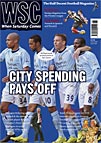 Derek Brookman reports on how the latest attempt to create a "superclub" in the Dutch region of Limburg hit the buffers
Derek Brookman reports on how the latest attempt to create a "superclub" in the Dutch region of Limburg hit the buffers
The notion of creating a football powerhouse in Limburg, the sliver of the Netherlands wedged between Belgium and Germany, is not new, and resurfaced this season with a plan to merge Fortuna Sittard and Roda JC. The idea of a Limburg superclub was mooted as far back as 1996, and extensive negotiations also took place in 2002 involving a third Limburg club, MVV Maastricht, as well. Tensions ran so high then that two members of the Roda board wore bullet-proof vests before addressing their own fans on the subject. In the end, just like six years earlier, there were too many differences of opinion to proceed.
Many had given up on ever having a united Limburg club. As recently as October last year all three clubs rejected a proposal by Henk Kessler, director of the Dutch FA, to revive the talks. But as usual money – or more specifically the lack of it – forced the issue. Both Fortuna and Roda were running at a loss, and when an independent steering group recommended that the clubs should fuse, they reluctantly agreed. Starting next season, an amalgamation known as Sporting Limburg would take their place.
The greatest sense of loss was in Sittard, because the new club were to play in Roda’s Parkstad Limburg stadium, more than 20 kilometres away in Kerkrade. The Fortuna stadium would only be used for Sporting Limburg’s youth teams. In addition, Fortuna are the smaller of the two clubs, and currently sit perilously close to the bottom of the Jupiler League, the Dutch second tier. It threatened to be a pretty lopsided merger. Olaf van Eijndhoven, head of the Roda board of commissioners, described the move as one of “equal partners who aren’t equal”, indicating that his Roda – who play in the top division – would inevitably be the dominant force in this new club.
But there was plenty of discontent in Kerkrade as well. During the home game against Ajax at the beginning of April, only days after the club had made public their intention to go along with the merger proposal, Roda fans ripped out seats and tossed them on to the pitch. They also cheered when Ajax scored the opening goal, and unveiled a banner stating their wish to be relegated. Many more inside the stadium whistled their disapproval of these actions, but obviously the idea that a club that beat Milan in the San Siro only seven years ago would simply cease to exist was too much for some to take.
Then, completely unexpectedly, the merger was dead. The Limburg provincial government, which had agreed to invest around €6 million (£5.39m) in the new club, withdrew its support, saying that Fortuna Sittard had failed to meet a precondition that they would rid themselves sufficiently of debt. While this is true, some suspect that the reason for this U-turn was the likelihood that the other two professional Limburg teams, MVV and VV Venlo, could justifiably ask for a similar level of investment from the provincial government as well.
The immediate future looked bleak. With three games remaining Roda found themselves in the relegation zone, and the situation was even worse at Sittard. With a debt in excess of €5m and no obvious solution in sight, the club might not even see out the season. The Dutch FA had already threatened to withdraw Fortuna’s professional licence if they didn’t sort themselves out.
But in the fortnight following the collapse of the merger, an astonishing turnaround took place. Fortuna reduced their debt level to €700,000 through acquiring new sponsors, with further improvement expected. Wil Meijers, chairman of the Proud of Fortuna foundation that is behind the fundraising, explained: “We couldn’t do anything for months because of the proposed fusion with Roda. Now we are bringing in an average of three new sponsors every day.” Meanwhile Kerkrade’s city council has agreed to provide €1m worth of help for Roda. So while there probably won’t be much happening on the pitch to cheer either set of fans in the short term, they have the considerable compensation that – for the time being at least – their clubs’ identities have been preserved.
From WSC 268 June 2009